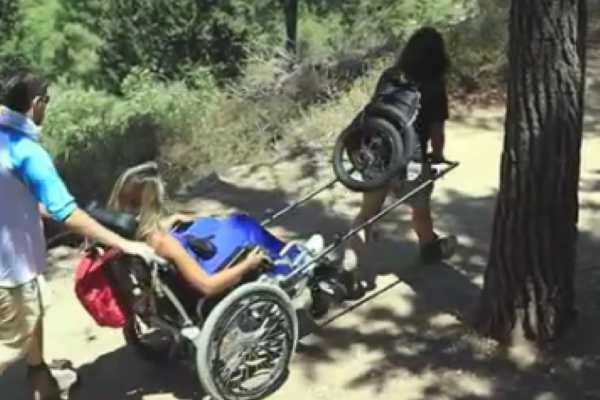One man’s mission to bring his disabled father on a hiking trip led to an innovative wheelchair and an organization that brings the disabled a unique chance to take trips in nature.
By Naama Barak, Israel21c
For Omer Zur, the fact that his dad has been using a wheelchair ever since sustaining grave injuries during his military service was no reason for him not to go on a post-army hiking trip in 2008, albeit somewhat belatedly.
“Thirty-five years after his injury, I decided that I’m going to fill in this gap of a post-army trip that he never had,” Zur explains.
“I did a few things ahead of it: First, I checked whether he’s interested, and he said yes. Second, I thought how we’re going to do it. After checking out all sorts of platforms and chairs that were on the market, we found that none of them suited our needs, so we decided to develop the Trekker,” he tells ISRAEL21c.
In designing this wheelchair for off-road use, they considered not only the rough terrain but also the user experience of both the rider and the escort who would be pushing or pulling the Trekker. The finished product, Zur says, is “very passable and creates the best hiking experience for everyone taking part.”
Finally, the last decision was to make the trip a social event. “We invited 34 friends to come hiking with us – my dad’s childhood friends, his current friends and also friends of mine. We traveled the Taurus Mountains in Turkey for a month,” Zur tells ISRAEL21c.
The hike they chose was challenging. They agreed ahead of time to sleep in tents and sleeping bags and cook on fires.
“We weren’t going to go easy on ourselves. And during that trek I saw and understood a few things that led me to found Paratrek,” says Zur.
Inclusive adventures
Paratrek was established in 2014 and operates under the slogan “Where there’s a wheel, there’s a way.”
Using the Trekker, Paratrek specializes in facilitating hiking trips for people with limited mobility and in creating inclusive, empowering outdoor activities jointly for people with disabilities and without.
Paratrek has taken groups across the world, including Australia, Jordan, France and the United States — even to Mount Kilimanjaro in Tanzania, in cooperation with Friends of Access Israel.
“Together we conquered Kilimanjaro, and together we also started this journey of spreading our methodology and Trekkers in the U.S., and we’re hoping to continue with this great cooperation in the future,” Zur says.
This spring, the organization will be heading out for a hike to the ancient Camino de Santiago pilgrim route in Spain, and immediately after that to the Sinai.
The ‘Wheels’ of Paratrek
“The first ‘wheel’ of what we do is research and development, the manufacturing and marketing of our Trekkers to any kind of organization that provides services to people with disabilities, to any park or nature authority, so that more people across the world can go out and fulfill their basic right of going out to nature and traveling,” Zur explains.
“The second wheel is the wheel of integration. When people with disabilities are integrated into frameworks of people without disabilities in their day-to-day life, and that framework goes out on a trip – a school trip, a work fun day, a pre-military academy hike, a trade union trip – those people with disabilities usually stay home. We’re here to integrate them and to allow them to fully take part in these activities too.”
The third wheel is education, including lectures, outdoor activities and informal meetings.
“Here we have two goals. One goal is to bring people with disabilities together with people without disabilities,” says Zur.
“Some 20 percent of the general population in Israel is made up of people with disabilities, and we don’t see them in the public space – the cinema, the supermarket, the restaurant – because we’re a non-accessible society. So we’re trying to get people to meet … and enable relationships to grow.”
The other goal is to help the population without disabilities define their own goals and dreams and identify what prevents them from accomplishing them, and whether these are objective or subjective factors.
Holistic Approach
Paratrek, which employs some 25 staff members, organizes and facilitates trips and activities for schools, workplaces and programs such as Birthright.
“There are a few organizations that aid people with disabilities to go out to nature, but unlike us, they don’t emphasize the social dimension and the integration,” Zur notes.
“There are also all sorts of organizations around the world that sell different platforms and outdoor chairs, but the emphasis is on very specific things that don’t create this holistic, optimal experience for participants.”
The reception to Paratrek, he adds, has been overwhelming.
“The responses are amazing and very moving. They range from simply thrilled, excited and positive responses to people who really lay out to us how Paratrek’s activities and services changed their lives, fulfilled their dreams, or changed their outlook and awareness. It’s really very cool. We too are also very moved by the end of each activity.”
Zur hopes to provide such services to more and more people or organizations that work with people with disabilities. He also wants to spread the word broadly, by marketing the Trekkers and Paratrek’s educational and integrational programs, “and to duplicate our model here elsewhere in the world.”
